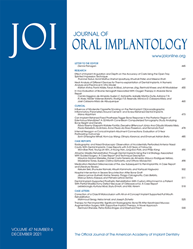
Volume 49, Issue 1
This study’s results indicate it might be helpful for patients taking antiresorptive drugs to have prophylactic antibiotics and more frequent follow-up periods to allow safe implant placement.
LAWRENCE, Kan. (PRWEB)
May 01, 2023
Journal of Oral Implantology – A possible complication known as Medication-related osteonecrosis of the jaw (MRONJ) concerns dentists and dental surgeons when patients take antiresorptive drugs (ARDs). ARDs induced side effects that can be critical for patients undergoing bone regeneration therapy before dental implant procedures. MRONJ can occur due to the disruption of blood flow to part of the jawbone. Ensuring patient well-being is highly important, so experts have widely debated the efficacy and safety of bone grafting and implant procedures for patients taking ARDs.
Researchers from Ludwig-Maximilians-University in Munich, Germany, King Abdulaziz University in Jeddah, Saudi Arabia, and Alexandria University in Alexandria, Egypt, recently published a study in the Journal of Oral Implantology to assess the effects of ARDs on dental implant treatment plans. Lead author Sven Otto, MDS, DDS, and colleagues state, “The purpose of this study was to investigate the clinical outcome of dental implant surgery in patients treated with antiresorptive therapy and determine whether it is possible to place the dental implants safely in those patients.”
Otto et al. thoroughly reviewed the records of 16 patients treated with 39 dental implants, with a history of ARD use, between 2010 and 2019 to determine MRONJ occurrence, implant success, and survival rate. Researchers examined radiographic images taken on the day of implantation or at suture removal and follow-up. In addition, they assessed patient complaints and wound healing to determine if ARDs negatively impacted patient recovery and increased complication risk. During the study, six patients with 12 implants were lost during follow-up for other medical issues or no complaints related to the implants, leaving ten patients and 27 implants.
Findings from the study showed no incidence of MRONJ, no failed implants, and an overall success rate of 92.6% (25/27 implants); the remaining two implants were in satisfactory condition, with no failed implants. Researchers also note no subjective complaints relating to pain or postoperative complications. Peri-implantitis, or inflammation surrounding the dental implants, was recorded in 30% of patients and 29.6% of implant sites. Peri-implant mucositis, an inflammatory lesion, was reported in 50% of patients and 37% of implant sites.
Results of this study showed no significant complications from ARDs use, suggesting that by following a specific surgical treatment protocol, implant placement should be safe in patients taking ARDs. However, given the rates of peri-implantitis and peri-implant mucositis, Otto and colleagues conclude, “This study’s results indicate it might be helpful for patients taking antiresorptive drugs to have prophylactic antibiotics and more frequent follow-up periods to allow safe implant placement.”
Full text of the article, “Clinical and Radiographic Outcomes of Dental Implants in Patients Treated with Antiresorptive Drugs: A Consecutive Case Series,” Journal of Oral Implantology, Vol. 49, No. 1, 2023, is available at https://doi.org/10.1563/aaid-joi-D-21-00035
###
About Journal of Oral Implantology
The Journal of Oral Implantology is the official publication of the American Academy of Implant Dentistry. It provides valuable information to general dentists, oral surgeons, prosthodontists, periodontists, scientists, clinicians, laboratory owners and technicians, manufacturers, and educators. The JOI distinguishes itself as the first and oldest journal in the world devoted exclusively to implant dentistry. For more information about the journal or AAID, please visit: http://www.joionline.org/orimonline/?request=index-html
Media Contact:
Samantha Weinkauf
KnowledgeWorks Global Ltd.
785/289-2649
Samantha.Weinkauf@kwglobal.com
Share article on social media or email:

